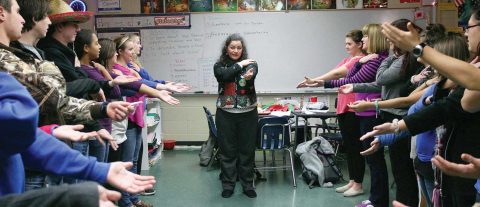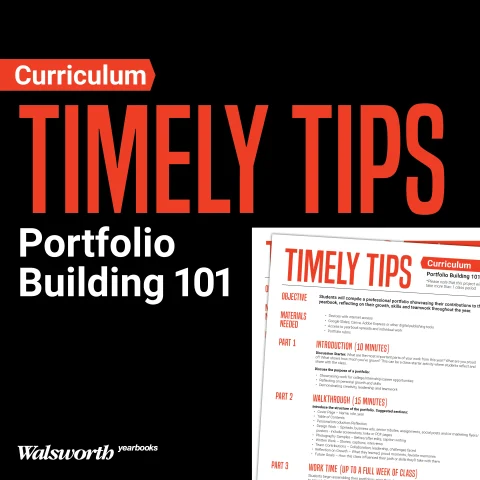Updated by Walsworth Yearbooks
Great yearbooks start with invested students. Students who desire to put out a great product need to be inspired to do so, and that inspiration should come from the students who are leading the staff. Give those leaders great training and put them in charge. After all, it is their yearbook.
To develop your editors and managers into leaders, begin in the spring and continue the training and bonding through the summer. A number of processes and resources are available for you to use. This article touches on just a few.
The training environment
Both Susan Massy, adviser at Shawnee Mission Northwest High School in Shawnee, Kansas, and Stefani Russ, adviser at Raymore-Peculiar High School in Peculiar, Missouri, use similar approaches in totally different environments to train their leaders.
Massy has a class apart from her publications classes called Editorial Leadership for the leaders of all the school’s media. One of the first things the students do is take a personality test, specifically the True Colors test. It’s expensive, but she suggested asking teachers or counselors in your school to see if they have it; she got it from a physical education teacher about 15 years ago. The True Colors test helps people understand their personalities and provides ideas for how different personality types can work together.
Massy helps leaders understand how groups come together and form, using the model created by Bruce Tuckman, a psychologist, in his article, “Developmental Sequence in Small Groups.” He describes a sequence, which he termed forming, storming, norming and performing, that most groups follow before becoming efficient. Massy also discusses conflict management, and assigns a project on the topic to help students better learn how to resolve conflicts.
According to Massy, one concept that has improved the relationship between the editors and staff has been the idea of servant leaders, where the editors approach staff with the thought of “How can I help you – what do you need from me?”
Russ also uses the servant leader model as part of her training, which she does at a leadership retreat. The retreat is annually in March or April, when the current year’s book is done. All students in a leadership position on one of Ray-Pec’s three publications attends.
Like Massy, Russ focuses on developing leaders in general, not just publication leaders.
“For many of these students, they have never experienced a leadership opportunity. We talk a lot about what servant leadership looks like and getting a visual of what style of leadership they will present to the staff,” Russ said.
Russ’ students also learn more about their specific jobs and create a list of tasks to be done before the school year starts.
While her three favorite resources on leadership are “The 7 Habits of Highly Effective Teens,” “Good to Great” and “The 5 Minute Manager,” Russ uses online resources such as beleaderly.com to keep content fresh for returning leaders.
Who’s the teacher?
If the editors are in charge, then the editors should teach. Staff leaders should be in front of the staff from the beginning, so the staff is used to being taught by peers. If you need to help your leaders with talking to groups, go to YouTube and search “public speaking for teens” for some lessons.
Your editors will feel more comfortable teaching before a group when they know the material well. Make sure they are proficient at their jobs and have them practice giving the lessons.
Decide what you should teach and what your editors should teach. Massy teaches the foundational aspects of yearbook, and her editors create lesson plans and teach production duties, using lots of samples to explain concepts.
Since the yearbook class or club is the time for teaching the staff and creating the yearbook, the editors need to be available to teach, oversee and assist. Therefore, editors need to meet outside of class time at least once a week to get their work done and plan for upcoming production tasks.
Training using mentors
To train incoming staff members and develop leaders, consider pairing up new and experienced staff members like they do at Rye High School in Rye, New York.
At Rye, only seniors who took yearbook the previous year and juniors can be on the yearbook staff, and those returning seniors are the leaders, Tony Campbell, adviser, said.
The juniors and seniors pair up just before school is out in the spring, and they are given summer coverage assignments. In the fall, the pairs work together on coverage, but in January, the juniors work on undergraduate sections and winter sports while the seniors create the senior-specific sections.
“The mentoring eliminates any sort of divide between editors and staff but there is still a clear understanding of who has the leadership responsibilities so the staff responds very well to demands by editors,” Campbell said.
And then the new leaders are ready for next year.
“Having watched and learned from their senior editor/mentors so closely as junior staff they inevitably come in senior year with very specific ideas about how they will want to fulfill their leadership responsibilities,” he said.
Follow the leader
Who doesn’t like a game? Games and activities can be used to teach and reinforce skills needed for leadership.
David Zinsmeister, adviser at Manchester High School in North Manchester, Indiana, said the first game he always uses with groups is the human knot exercise. First he instructs them to untangle themselves without speaking, and then the students try again and are allowed to talk. Then they discuss what worked and what did not.
“The key with any activity that is used with students is to make sure it is legitimate for that group and that it enhances their social and educational style,” Zinsmeister said.
Zinsmeister said games and activities targeting leadership and teamwork let students step back and examine why certain things worked and others did not in a situation outside yearbook. Discussions are also critical to addressing questions such as “What are we going to do now?” and “How does it feel when this happens to you?”
“With yearbook, we are constantly rethinking approaches, creating new coverage and re-evaluating the completed efforts. There are numerous opportunities for students to learn the importance of leadership and teamwork and for us as advisers to pull them aside and help them to see it,” Zinsmeister said.
Leadership building games and activities can be found in numerous resources, both online and in print, including the Yearbook Suite unit, “Staff Management Through Team Building.” Zinsmeister said the key is to find things that work with the personalities on your staff.




